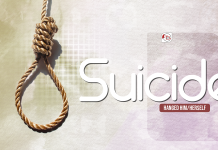The COVID-19 pandemic with its ensuing lockdown and quarantine has instilled unimaginable fears in people’s minds. Some fear death for themselves and their loved ones, others are overwhelmed by boredom and are aberrant from their normal routine. This pandemic is leaving discernible scars on people’s psyche, affecting the day-to-day activities of life and sending shockwaves of anxiety across the globe.
In the mid-november of 2019, China reported her first case of COVID-19, a respiratory disease caused by the virus SARS-COV-2. The megacity of Wuhan was the epicenter of the disease. Due to the unawareness and lack of prompt action, the virus first escaped the city, then the province and soon had clutched the entire country in its grip. From there, the virus spread throughout the whole of Asia, affecting Pakistan, Iran, and India on the way, stretching its tentacles all the way to America and Italy. Observing its rapid spread, WHO declared it a Global Pandemic and issued numerous precautionary strategies. At the time of writing, more than half a million people have contracted the disease and roughly 30000 have died globally. Almost 190 countries are plagued with the virus. As of March 29, the United States is the largest hit, followed by Italy and China respectively.
China hastily took measures to contain the virus but till then, it was too late. Afterwards, governments and global health organizations warned people to take the necessary precaution to confine its spread. These measures included frequent hand washing, social distancing, self-Isolation, and Quarantine. These steps aimed at reducing the spread of the virus and therefore curb the physical damage. But what about the mental damage?.
”Humans are social animals”, this ostensibly hackneyed clause accommodates a firm fact of human evolution. For thousands of years, our ancestors roamed over the African Savannah. Their food came from hunting Animals and gathering Fruits. This mode of life gave them the sobriquet of ”Hunter-Gatherers”. Unlike today, nature tested you at every step in Africa. A single reckless action could easily translate into a death sentence. For an individual, chasing antelopes, gathering mushrooms, developing tools, and vigilance from prowling predators was an arduous business. To counter this, early humans engaged in social bonding, with the contribution of bipedalism, brain growth, and soaring child mortality rates. As a result, early societies with interdependent individuals emerged. Their collective synergy gave them an edge and thus fuelled their survival.
Today, the pandemic is forcing us otherwise. Social distancing, self-Isolation, and quarantine have veered us away from our evolutionary predilections. We are forced to adopt an alien routine of life. This will, no doubt, help in confining the virus but might leave indelible scars on our psyche. The concomitant fear and anxiety of the pandemic are not unique. This has been observed in numerous natural disasters but in the case of COVID-19, it is indefinite. Vaccines might at least take a year and a half. Till then, the incessant quarantine might disrupt our lives beyond repair.
The feeling of isolation might be the same for everyone, but the underlying causes will be different. In a developing country like Pakistan, the poor will be the hardest hit. A major fraction of our population subsists on menial employment with a meager salary. Others stand on the roads, searching for people that might hire them. By digging trenches and unloading trucks, these laborers earn their wage which they spend on essential groceries. The national lockdown has looted them from the opportunity. Watching their children sleeping empty stomach will surely nudge them in the morass of depression. For a poor, depression is not a novel experience, which makes them particularly vulnerable to it. Meticulous psychological research has shown that two episodes of recurrent depression increase the odds of the third by 75% and fourth by 95%. Placed in an indefinite quarantine, the poor might find it the hardest to survive.
The rich sections won’t live in equanimity and salubrity. Investors and businessmen constantly analyze the tiniest nuances of the stock market to generate millions and evade the potential loss. Plummeting economies and shutting industries might rob these people from a good sleep. Investors are an impatient bunch. Their odds of ending up in depression are relatively high. Once ensconced, it can get really hard to liberate someone from a defective mental state. Studies have shown that the survivors of the Holocaust hoard more food than average, despite living well-settled, safe and fiscally moderate lives in the developed world. This points towards a psychological perception shaped by the chronic atrocities of the Nazi concentration camps. Who knows what perceptions this pandemic might carve.
Various possible ways have been suggested to remain mentally resilient. By conforming to the instructions of the Government, one can utilize one’s free time in quarantine and circumvent boredom. Gaming is an option, but only a palliative one. WHO suggested a few measures to retain mental and physical health:
Firstly, do not preoccupy yourself with excessive news. The director-general of the World Health Organization advises reading news once or twice a day. Don’t regard any pertinent news on social media as true, look for authentic sources. Secondly, comfort yourself and your family. Instead of showing them false clips of infected people writhing in agony on roads, inform them about the thousands of patients that have recovered.
Thirdly, don’t sequester yourself in an isolated dim-lit room. Instead, try to spend your time with your family. Organize a movie gathering and watch Harry Potter with your kids. Try video conferencing with your friends and relatives. Let them know that you care. This might fetch feelings of nearness. Fourthly, try to pursue the things that you once coveted, but never strived for. Like writing an article or playing the guitar that’s been hanging on the wall for months.
Fifthly and finally, maintain your physical health. Don’t let yourself slide into bad shape. Eat healthily, avoid surfeit sugar & fat consumption and limit smoking. Try yoga or meditation. Run up and down on the stairs of your apartment or try doing minor exercises like push-ups and pull-ups. Remember to invite your family to join you.
These are indeed hard times. This pandemic might be one of the worst experiences of our lives. It is our collective responsibility to remain mentally resilient. Instead of being ensnared into the quagmire of depression and anxiety, we must try to maintain optimism. All of the news agencies must provide the stats of people that have successfully recovered from the illness, remind the viewers that the National and Global authorities are searching for a solution. Instead of traumatizing ourselves and others, we must eschew pessimism. The government might save us from COVID-19, it is our duty to save ourselves from psychological illnesses.
___________________________________________________
Disclaimer: The views and opinions expressed in this article are those of the author and do not necessarily reflect the official policy or position of The Balochistan Post or any of its editors.






























